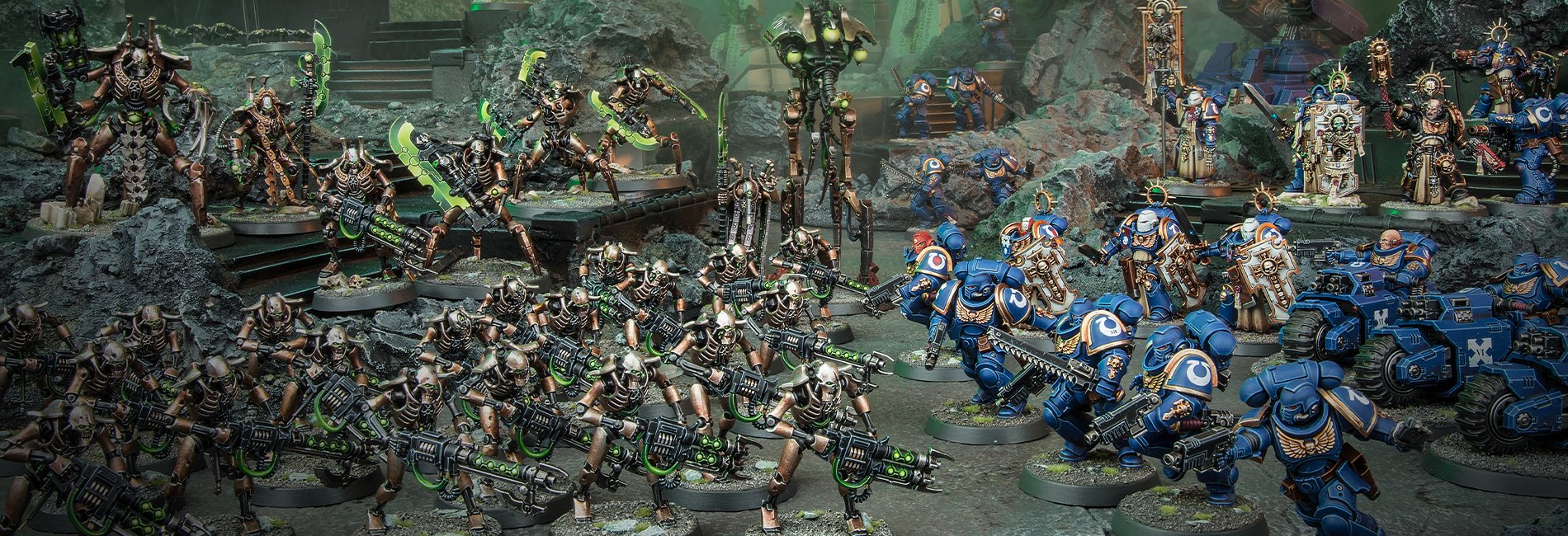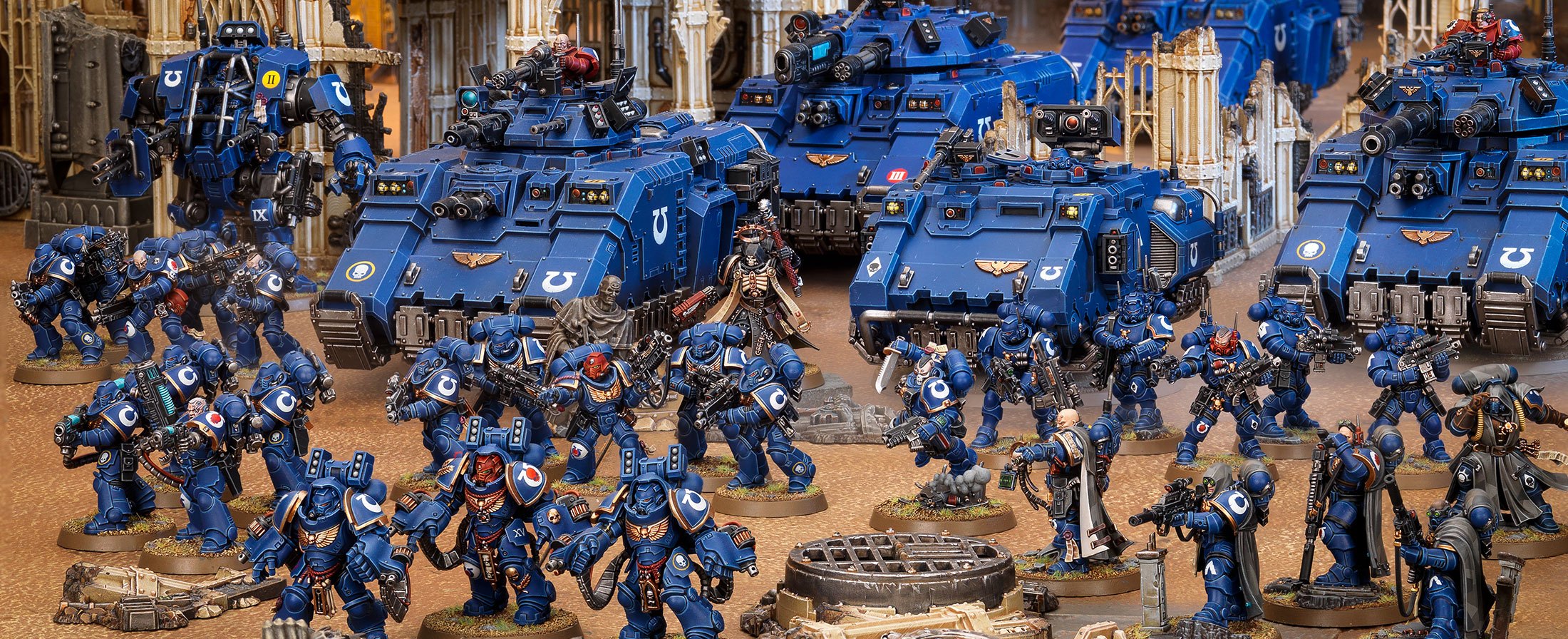
Warhammer 40k is very dumb. Warhammer 40k is so outrageously, insanely, apocalyptically, earth-shatteringly, face-meltingly dumb and I love it so much I must share its stupidity with the rest of the world.
At its core, Warhammer 40k is a tabletop strategy game where players use miniature models to assemble armies to complete objectives in a variety of game types. The hobby has a surprising amount of depth to it, with a ninth edition rulebook released just last year. The game types are split between larger wargames where players take control of armies composed of vehicles, infantry, artillery, etc. and a smaller, squad-based game type called ‘Kill Team’ where players take control of individual soldiers. A major part of the hobby is collecting, assembling and painting the game’s incredibly detailed models. It’s somewhat similar to building model airplanes, except each airline has a function in a larger game. Some players take it upon themselves to personalize their models, so no two armies are the same.
Warhammer 40k has also branched out into more than just the tabletop game. The Warhammer universe has been adapted into dozens of video games, comics, animated short films, and over 350 novels. That wasn’t a typo. There are over 350 books written about Warhammer 40k. Additionally, Warhammer 40k’s novels and aesthetic are largely credited as pioneering the subgenre of “grimdark fantasy”. Grimdark fantasy is a term used to describe works of fantasy literature that are uniquely amoral, dystopian, or just flat out bleak. “Grimdark” itself comes from Warhammer’s slogan “In the grim darkness of the 41st millennium, there is only war.” Considering Warhammer is a game about Now you may be thinking to yourself, “If Warhammer is so big and so influential, how come I haven’t heard of it?” That is probably because Warhammer is really too big to be talked about. Unlike many kinds of fiction, Warhammer’s lore is so utterly massive that no one person can really get a comprehensive understanding of it in its totality.
But what does all this science fiction/fantasy nerdbabble mean? Science fiction and fantasy rely on utilizing allegory and exaggeration to weave commentary on the societal structures of the real world. Warhammer has a lot of stuff going on inside it but what is its thesis? What scathing critique does Warhammer bring to the table? Well, that’s the thing, it doesn’t. The deepest commentary Warhammer gets is that blind religious worship and totalitarian governments are bad…which kind of goes without saying. Additionally, Warhammer lore has almost no character arcs with which to tell a cohesive narrative. The books of course follow certain characters but their purpose is more like a tour of the universe itself, as none of their actions really significantly sway the trajectory of the series. Because the game is based off of a tabletop strategy game, looking for character arcs is kind of like looking for character arcs in Ronald McDonald, Grimace, and The Hamburglar. So if the thesis statement of this massive, enduring universe says nothing at all, what is to be made of it? How has Warhammer continued for almost forty years without any kind of core themes? How does it retain its identity and contribute to the people who play it? The answer is simple: because it’s cool.
Warhammer has aged so well after forty years not because the expansive science fiction universe it takes place in has a greater statement to make, but instead works on the merit of how its fiction functions. This is not to say that science fiction that has overtly political, social, or philosophical commentary has no merit, the very best of science fiction usually does, instead works like Warhammer succeed in simply making an expansive world that is enjoyable to interact with. Simply put Warhammer’s appeal comes from the dominance of “the rule of cool” found in every aspect of the universe. The reason there are orcs that can change the world with their minds in Warhammer is so there can be orcs that change the world with their minds. Warhammer is lava cake science fiction: it has almost no structural integrity when put under the barest scrutiny yet is still sinfully delicious. This is most evident in how the creators at Games Workshop refuse to canonize to major events in the lore. Warhammer maximizes its science fiction setting to create as many ridiculously juvenile additions to its universe and is completely unrepentant in doing so. Warhammer is gleefully irresponsible with the creations that exist within its universe, snowballing each extreme idea to be more catastrophically indulgent than the last.
Warhammer’s dedication to making aspects of its universe spit in the face of any kind of logic and instead driven just off its cool factor warrants merit because it does not pretend to be anything else. Because Warhammer originates from a game (that is still being played) rather than books, film, or television, its specific brand of science fiction is meant to be interacted with, rather than consumed. More specifically, the foundations of Warhammer’s fiction functions more like a rulebook rather than a story. This is interesting because it gets to the heart as to why Warhammer throws narrative to the wind in favor of having a functional universe, because it wants to give players the power fantasy of being a tactical commander of comically overpowered legions of extragalactic soldiers. It does not need a story because in the moment-to-moment gameplay, all you need to do is think about what your next move is going to be, the rest is just set dressing. In that vein, creating a science fiction world that operates off of pure worldbuilding, especially one that has lasted as long as Warhammer, warrants some merit. In conclusion, Warhammer succeeds as a piece of science fiction because it is pure indulgent chaos and does not try to be anything loftier than that.
Comment Box is loading comments...

